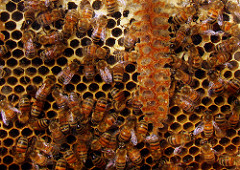What really struck me when viewing videos of Douglas Englebart and reading parts of his essay ‘Augmenting Human Intellect: A Conceptual Framework’ so kindly excerpted for us by Gardener Campbell, was when he talked about the idea of a Collective IQ.

As an invertebrate zoologist, when I think of a collective, a bee hive comes to mind. Individual bees are separate animals, but they function in a eusocial arrangement whereby the colony persists and grows as individuals do their different jobs of nursing, foraging and reproducing. E.O. Wilson referred to eusocial insects like bees (and ants and other Hymenopterans) as a “superorganism”. I don’t know if bee colonies offer us much in the way of a model for humans working together, but their abilities to communicate with each other puts humans to shame. I especially loved it when Englebart said “Collectively, we can learn how to work collectively better”. Because he both acknowledges that we don’t work so well collectively now, and that paradoxically, it is going to take a collective of us to figure out how to do it better! And so I think that much of the ‘augmentation’ of our ‘intellect’ is essentially about how we ‘put our heads together’, and how we use our technologies to basically learn how to work together more effectively. But somewhere in those 1962 videos and writings of Engelbart’s, there is also the implication that we need to go beyond connecting our minds together to putting our hearts together as well. These days, I think we need to be very explicit about this. Perhaps Engelbart’s Collective IQ needs to incorporate other IQ’s, like social IQ and emotional IQ. So what does a contemporary collective of intellectual, caring, human beings look like? How do we integrate the power of working and learning in the Open to go about creating this? To me these seem like the important questions. Engelbart says: “The complexity of man’s [sic] problems are growing still faster and the urgency with which solutions must be found becomes steadily greater in response to the increased rate of activity and the increasingly global nature of that activity”. And that was in 1962! The urgency and complexity have only been intensified, and while our technologies are more sophisticated- we have not made any progress towards creating the kind of human compassionate collective that I think we will need to address things like global climate change (and so much more). Indeed things seem to have just gotten a lot worse. I think a place to start is with an authentic practice of intersectionality (not just a recognition of diversity or inclusion). What do you think?





Oh yes! I think you’re absolutely right about the need to collectively engage hearts as well as minds, and to think (!) specifically about deploying other kinds of intelligence — the emotional in particular if we want to come even close to being the awesome communicators bees are. Thanks so much for this.
I, too, like your vision of a compassionate collective.
I’m *not* an invertebrate zoologist, so I don’t know much about bees (but I do study the literature of human social movements, specifically the American abolitionist movement, which achieved its ultimate goal, but with a lot of complications, complexities, and schisms along the way, and with some lingering unintended consequences of some of the strategies its proponents adopted). So I may be wrong about this, but it strikes me that one thing bees have going for them is a sense of collective purpose that’s pretty much hard-wired (this may also, of course, be a vulnerability if conditions change).
It seems that we humans often have trouble agreeing on what problems should be solved, let alone on the best approaches to solving them. The ongoing discuss/debate/whatever over global warming is, indeed, a good example; while there’s good scientific consensus as to the nature of the problem, the larger political/popular consensus lags far behind, which makes it hard to get the sort of financial and policy support necessary to solve the problem. Meantime, some very vulnerable communities are in imminent peril, and we’re not doing much to help them, in part because helping them would mean admitting that there is a problem. (At the same time, insurance companies seem to be quite aware/accepting of the problem, because their profits are at stake.)
I’m not sure where to go from there, except to suggest that maybe communication begins with trying to find problems we can agree on (at which point we need to agree on causes and solutions, which will be difficult endeavors in themselves).